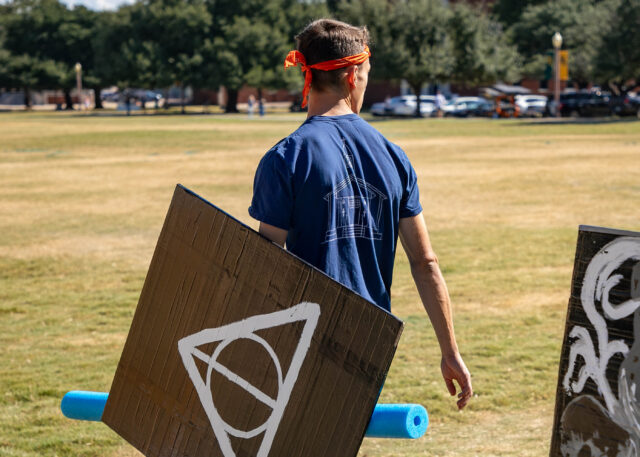By Hannah Webb | Focus Editor
Cardboard shields gleam under streetlights, pool noodles whip through the air and laughter mixes with shouts. The apocalypse has arrived, and the Honors Residential College couldn’t be happier.
Behind the mayhem is one of the HRC’s most beloved traditions: a three-day game called “Humans vs. Zombies” that transforms studious scholars into sprinting survivors.

The event is a sprawling, adrenaline-fueled game of infection tag, entirely organized and run by students. It begins with four “alpha zombies” lurking in the shadows, waiting for their chance to tag the unsuspecting. Once a human is caught, the infection spreads — and the chase begins anew.
This year’s theme, inspired by “Harry Potter,” added a magical twist to the usual chaos. Houses, spells and nightly missions infused the campus with Hogwarts energy as students competed for survival and points. At dusk, the air around Memorial Dining Hall buzzed with whispers of strategy; by nightfall, Fountain Mall had turned into an enchanted battleground.
Seattle junior Miya Shimada, one of three Game Masters overseeing the event, said months of preparation go into crafting the experience.
“It honestly starts before the semester even begins,” Shimada said. “We meet over the summer to plan the theme, outline the lore and create the nightly missions. Once the semester starts, we meet regularly to make sure everything runs smoothly.”
Each night features a mission — a structured challenge that advances the storyline and pushes players to think fast. Students race across campus under glowing streetlights, their footsteps echoing through the quiet quads. Monday night’s tasks included the book-savvy Ravenclaws scouring “The Sorcerer’s Stone” for specific lines, a teamwork-laden three-legged relay for the Hufflepuffs, an egg-cracking courage test for the Gryffindors, a cunning snake game for the Slytherins and a real-life round of wizard’s chess played under the stars.
This edition of chess, while not entirely enchanted, held close to the chaotic nature of the books. Pawns in party hats bounced on one leg, bishops held bibles in the air and knights hoisted friends on their backs in preparation for jousts.
Shimada said the Game Masters’ mission is to balance creativity and safety while nurturing camaraderie within the HRC.
“We end with a final battle between the few remaining humans and the zombie horde,” Shimada said. “But at the end of the day, our main goal is for everyone to have fun and to build community.”
Although the event pulses with energy, Shimada said safety remains the top priority.
“We don’t play within 10 feet of doors or stairs because they’re tripping hazards,” she said. “We just want everyone to stay safe — the residents are more important than the game.”
To ensure that, the organizers work closely with Baylor administrators and safety officers. The result, Shimada said, is an event that’s both exhilarating and well-regulated, resulting in crafted chaos.
“It really is a highlight of the year for a lot of HRC residents,” Shimada said. “We’re grateful the university continues to support it.”
For players, the game is more than a tradition — it’s a test of wit, endurance and nerve.
Andover, Kan., freshman Faith Butler joined the game for the thrill and the chance to make new connections.
“I knew people got really competitive, but it’s such a great way to meet people in the HRC,” Butler said. “I did senior assassin in high school and got out really early, so I wanted to make it as far as I can in this one.”
So far, Butler has remained uninfected — a feat she credits to quick thinking and careful planning.
“Yesterday I camped out at Moody until we got immunity for an event,” she said. “It’s kind of an adrenaline rush. I had to sprint this morning, but honestly, it’s fun — and it forces me to get places early.”
During Monday’s wizard’s chess mission, Butler served as the “queen” but was eliminated midgame.
“I didn’t end up doing much because I got killed,” she said with a laugh. “But it was still fun. Everyone’s been really into it.”
Beyond the competition, Butler said the event builds a sense of belonging — one noodle swing at a time.
“In the group chat, everyone sends zombie sightings and works together to stay safe,” she said. “It’s a great community builder. I’m already excited for next year.”
While HRC students dart across campus like characters in a live-action movie, other Baylor students often pause mid-walk, unsure of what exactly they’re witnessing.
Austin freshman Matthew Sykes said the sudden appearance of noodle-armed runners caught him completely off guard.
“I saw people walking into class with pool noodles and thought they were going swimming somewhere,” Sykes said. “Then I realized it wasn’t that, and I just got more confused as I kept seeing more people with noodles.”
Although Sykes said the game initially seemed strange, he admitted it adds a burst of life to Baylor’s campus.
“It kind of freaked me out at first, but it brings people together,” he said. “It’s a great tradition that gets people talking to each other.”
For Shimada, that reaction — curiosity turning into connection — is the whole point.
“It allows people who wouldn’t meet otherwise to meet each other,” she said. “It helps freshmen feel like they belong to something bigger than themselves.”
And for three nights every fall, the Honors Residential College proves that honors students can do more than just study — they can survive the apocalypse, too.